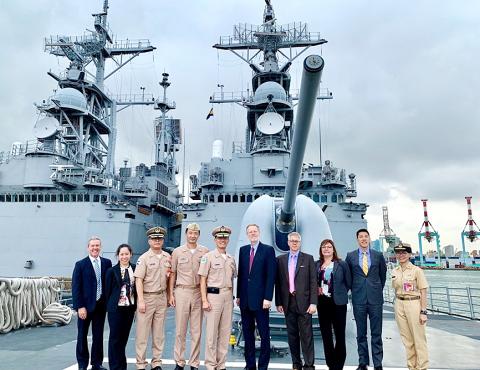American Institute in Taiwan (AIT) Director Brent Christensen yesterday visited Zuoying Naval Base in Kaohsiung, where he delivered a speech on US-Taiwan relations in the realm of defense and security.
As part of its year-long celebration of the 40th anniversary of the US’ Taiwan Relations Act (TRA), the AIT assigned a theme to each month of the year to highlight aspects of the bilateral partnership, and this month is Security Cooperation Month.
Christensen’s visit to the base, where he toured a US Kidd-class destroyer that had been turned into a Keelung-class destroyer and saw some of the amphibious vehicles bought from the US in 2006, was one of the events scheduled to highlight Security Cooperation Month.

Photo: Screengrab from AIT’s Facebook
In a series of Facebook posts about the visit, the AIT said that the US sells Taiwan defense equipment in accordance with the TRA to maintain regional peace and stability.
It also shared photographs of Christensen’s visit on its Facebook page and Instagram account.
“We are honored to visit the largest destroyer in Taiwan’s Navy,” Christiansen said. “This Keelung-class guided-missile destroyer was formerly an American Kidd-class destroyer and transitioned to Taiwan between 2005 and 2006.”
“It has strong anti-air, anti-surface and marine patrol capabilities and battlefield management capabilities,” he added.
His visit was organized by the Ministry of National Defense’s Strategic Planning Office.
Christensen later met with Kaohsiung Mayor Han Kuo-yu (韓國瑜) “to learn more about his vision for Kaohsiung and his work since taking office,” the AIT said.
Han said that he did not talk about the latest arms deal with the US, the sale of F-16V fighters, but focused on development and changes in Kaohsiung.
They also discussed cross-strait relations, Taiwan’s relations with Hong Kong and Macau, and US-Taiwan relations, the mayor said.
Additional reporting by CNA.

The Chinese military has built landing bridge ships designed to expand its amphibious options for a potential assault on Taiwan, but their combat effectiveness is limited due to their high vulnerability, a defense expert said in an analysis published on Monday. Shen Ming-shih (沈明室), a research fellow at the Institute for National Defense and Security Research, said that the deployment of such vessels as part of the Chinese People’s Liberation Army (PLA) Navy’s East Sea Fleet signals a strong focus on Taiwan. However, the ships are highly vulnerable to precision strikes, which means they could be destroyed before they achieve their intended

The Taiwan Experience Education Program (TEEP) has funded short-term internships in Taiwan for more than 4,500 young people from more than 40 countries since 2015, with the goal of attracting and retaining international talent, the Ministry of Education said yesterday. Fifty-five colleges launched 514 projects this year, including in fields such as semiconductors, artificial intelligence, medicine and biotechnology, green energy, and sustainability, it said. The program provides research and practical internships in Taiwan for two to six months, and offers cultural exchange and networking opportunities, the ministry said. For example, National Formosa University’s Embedded System and Autopilot Laboratory developed two solar-powered drones in

GLOBAL: Although Matsu has limited capacity for large numbers of domestic tourists, it would be a great high-end destination for international travelers, an official said Lienchiang County’s (Matsu) unique landscape and Cold War history give it great potential to be marketed as a destination for international travelers, Tourism Administration Director General Chen Yu-hsiu (陳玉秀) said at the weekend. Tourism officials traveled to the outlying island for the Matsu Biennial, an art festival that started on Friday to celebrate Matsu’s culture, history and landscape. Travelers to Matsu, which lies about 190km northwest of Taipei, must fly or take the state-run New Taima passenger ship. However, flights are often canceled during fog season from April to June. Chen spoke about her vision to promote Matsu as a tourist attraction in

Taipei resident Mu Chu-hua caught some glimpses of China’s mighty military parade on YouTube on Wednesday. As she watched hypersonic missiles roll down Beijing’s Changan Avenue and troops march in lockstep, she did not feel like they posed a threat to Taiwan. Mu, a 69-year-old retiree, said she saw the parade as simply a way for Chinese President Xi Jinping (習近平) to “say thank you to the troops.” “I thought it was quite normal,” she said. “It was very cool.” China’s military parade commemorating the end of World War II was being watched internationally for insights into Beijing’s military advances and its show